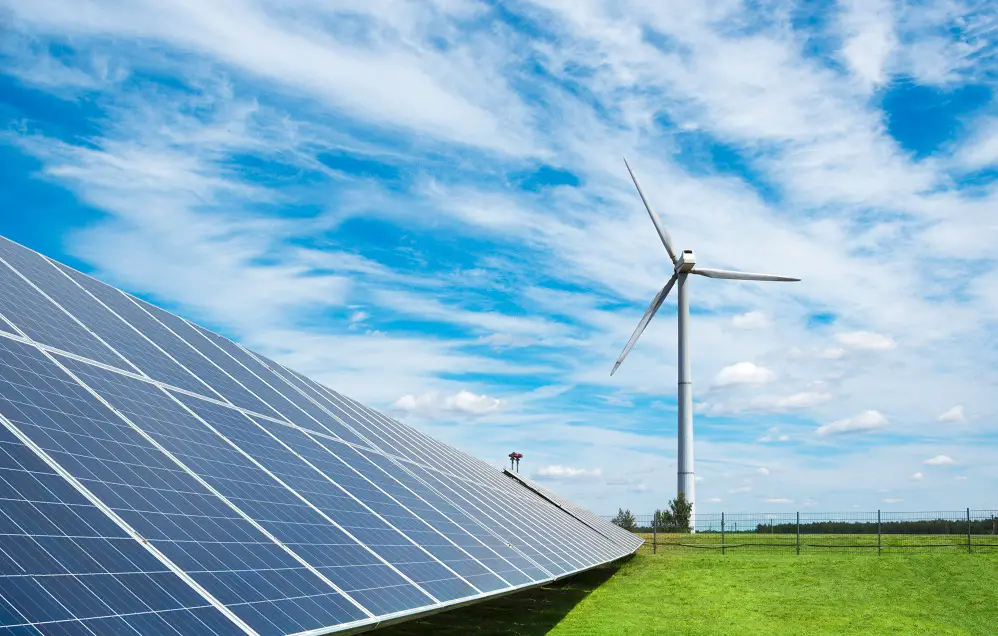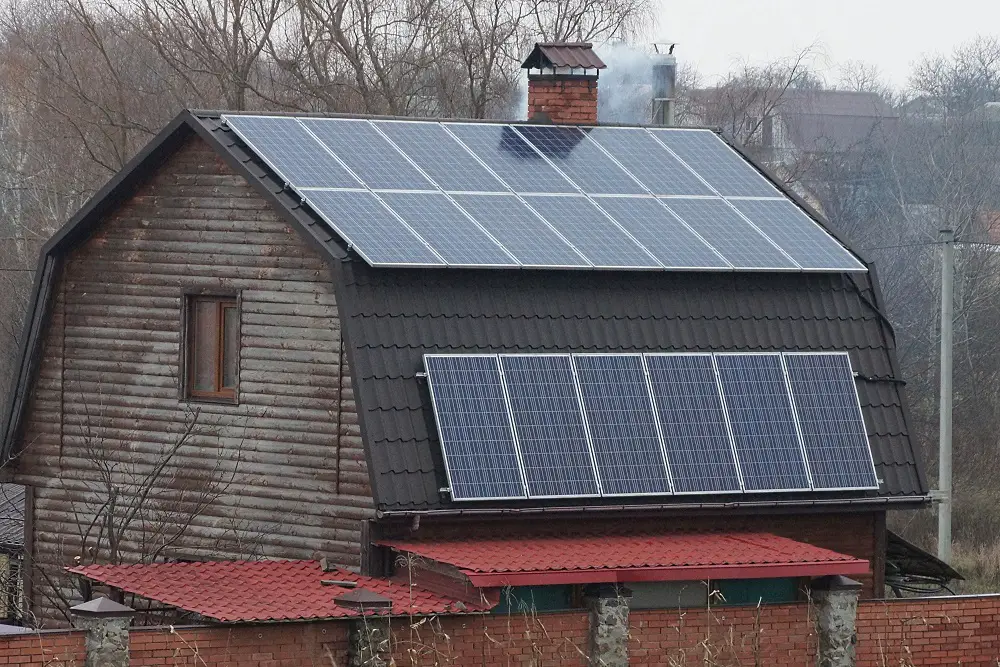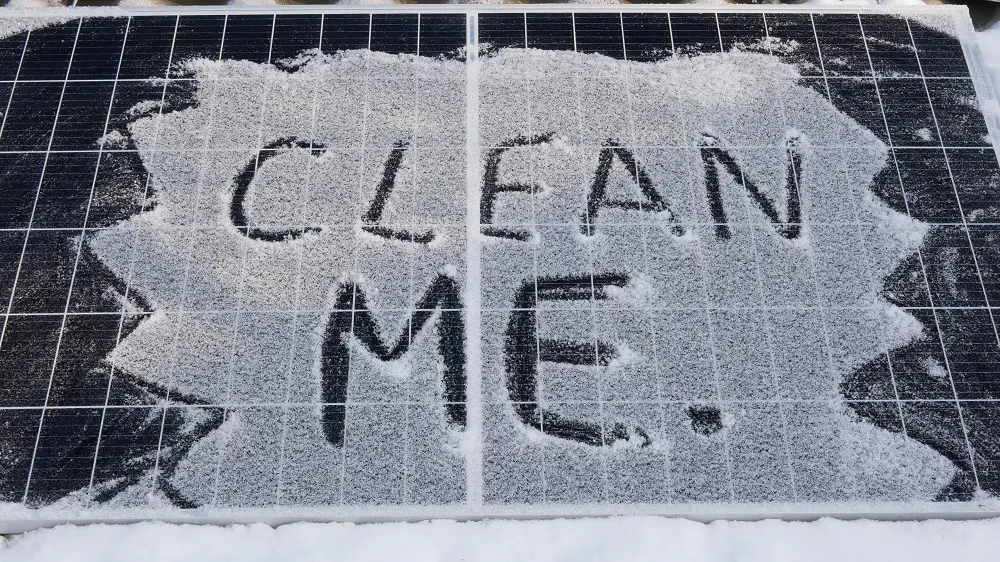Every year, there should be an annual inspection done by a professional – typically costing $150. If paying for the cleanings as well, they each cost $150 and can be once or twice a year (so $300).
In total, maintenance can be up to $450 or as little as $150 if you clean the panels yourself. For cleaning, be sure to use biodegradable soap and a soft rag (no abrasive soap or sponges as that will scratch the glass).
Annual Inspection by a Licensed Solar Contractor
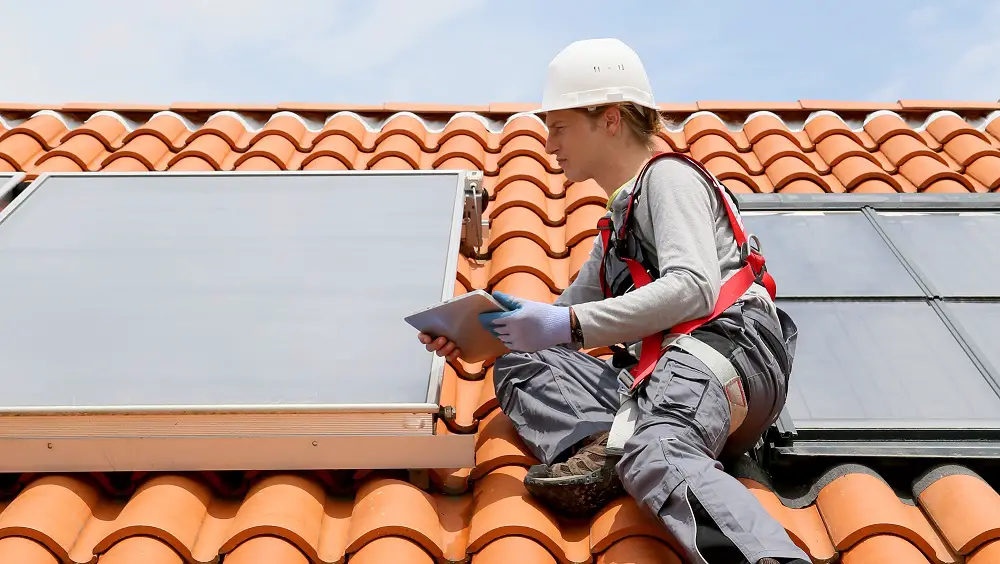
There should also be an annual inspection conducted by a licensed solar contractor. As most solar panels are installed on rooftops, for safety it is best to not do this yourself as there are risks of falling or being shocked. This service will consist of checking the following:
- A general performance check of the system by reviewing daily output data
- Checking that the solar panels are free of debris, cracks, corrosion, browning, and moisture penetration
- Making sure no shade is affecting the modules, such as overgrown trees
- If installed on the roof, checking the roof condition underneath the panels
- Inspecting the cables to make sure they are secure and that the voltage levels are within bounds
- Checking that the mounting hardware is in good condition with no loose screws, including that the ground connection is secure
- Verifying that the junction boxes do not have water accumulation and that the seals, connections, and clamps are in good condition
- Checking the breakers for damage and confirming the isolation devices are working properly
- Inspecting the fuse boxes for water damage as well as resistive joints on connections
- Checking for damage on the inverter, any resistive joints on connections, and verifying the DC voltage
- Checking the age of the inverter (most inverters need to be replaced between 6 – 11 years of age)
How to Find a Good Solar Professional?
First, make sure that the solar contractor has a valid contractors’ license and does not have any outstanding complaints at the Contractors’ State License Board. See if the solar professional has any online reviews and confirm that they have performed work in your area.
Check if they have workers compensation insurance, and if they include a warranty with their work. Also, make sure the solar contractor is familiar with your type of system and has received proper training for the specific equipment. Lastly, always be sure to get a contract in writing before any work is done.
Are the Maintenance Requirements Different for Ground Mounted vs Roof Mounted?
There is no difference in maintenance for ground mounted versus roof mounted solar panels; however, ground mounted are easier to clean due to their easier access.
The Effects of Extreme Weather
Solar panels are very durable and can even survive hurricanes as well as hail. They are not completely unbreakable, though, and can be damaged by tornados, lightning, hurricanes and hail.
Hot weather affects the solar panels the most as the panels lose efficiency by 1% per every degree above 77°F; This effect can be minimized by raising the panels off the ground to allow for ample air circulation.
Warranties
Warranties give you piece of mind for long-term security. A standard warranty for the panels is 15-25 years and includes a guarantee of 90% performance and repair for any damage. Sometimes, providers include a few maintenance visits as well. The warranty may have a stipulation in which the solar system must be properly maintained to be under warranty, so be sure to have them cleaned once or twice a year. Also, each part may have a different service warranty (such as panels, inverter, and racking).
Below are the most common warranties offered:
- Solar panel performance warranty: 25 years
- Solar panel product warranty: 5-10 years
- Inverter warranty: 5 years
- Installation warranty: 1-2 years (but can be up to 10 years)
If you sell your home or lease out the equipment, the warranties are usually transferrable to the new owner and increase the re-sale value of the house; however, please contact the solar provider first to ensure a smooth transition.
What do Warranties not Cover?
While solar warranties can cover most things, there are a few notable items that are not included:
- A specific guarantee of solar production
- Cost of labor to diagnose and replace/repair the system (this can be very costly)
- Damage to solar panels due to power surges or failures, fire, flood, lightning, or other acts of nature
- Damage by accidental breakage, vandalism, explosions, or acts of war
- Cost of lost solar production during downtime of a failed component (for example, 1-2 weeks of downtime when an inverter needs to be replaced)
Does Homeowners Insurance Cover the Solar System?
Most homeowners insurance covers damage to the panels as they are considered a permanent attachment or structure to the property. There should not be any claim limit either as the solar system is not separate from the house structure.
Be sure to check with your homeowners policy and see if it’s necessary to increase the amount of coverage to include the solar, which may raise premiums. Sometimes, certain solar systems (such as carports and ground-mounted systems) may require an add-on or separate policy all together.
How to Evaluate a Solar Warranty?
There are certain specifics to look for when reading through a warranty. For example, what is the average response time if work needs to be done? Is there a limited number of claims that can be made? Does the inverter include a replacement warranty? What happens if one of the parts manufacturers goes out of business?
Performance Warranty
The performance warranty guarantees that the system’s output will not drop below a specific percentage or baseline during the lifetime of the panels. The expected degradation of solar panels output is 10-20%, gradually decreasing every year. Most companies offer a linear warranty in which the guaranteed production decreases by a constant rate, usually 0.5-1% per year. Other manufacturers offer a step warranty in which they promise at least 90% production for the first 10 years and at least 80% production for up to 25 years. If the performance is not met, then the providers will replace or repair the malfunctioning panels.
Below are the warranties offered by the top four solar manufacturers:
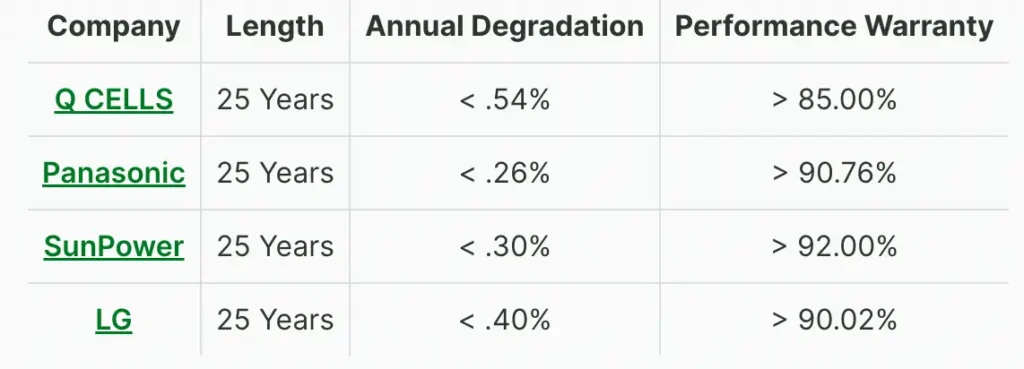
Product or Equipment Warranty
The product or equipment warranty guarantees the solar panel’s capacity to produce energy. This warranty generally covers any defects, equipment failure, faulty wiring, corrosion, and premature wear. Most manufacturers provide a 10 year warranty, with some premium warranties covering the entire 25 year life of the panels.
Installation or Workmanship Warranty
The installation or workmanship warranty covers the work the contractor did for the installation of the solar system. This warranty may be for 5,10, or even 25 years for the full lifetime of the panels. A workmanship warranty is highly valuable and can save you thousands on future repairs and maintenance.
How Can the Warranty be Voided?
The terms and conditions list the specific causes and conditions that may void your warranty. Some common reasons include:
- You or an unregistered contractor installed or made repairs to the solar panels.
- The panels were repaired without the provider’s approval.
- A company other than the original installer did repairs.
- The panels were not properly maintained.


